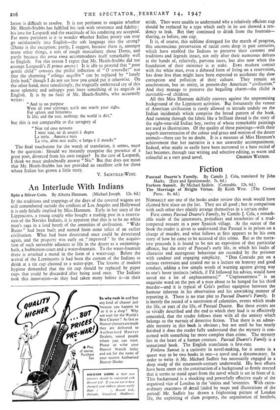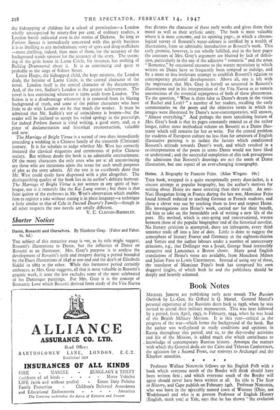Fiction
Forlorn Sunset. By Michael Sadleir. (Constable. 12s. 6d.)
NoemAtii, any one of the books under review this week would have claimed first place on the list. They are all good ; but in comparison with each other they plainly arrange themselves in a certain order First comes Pascual Duarte's Family, by Camilo J. Cela, a remark- able study of the ignorances' prejudices and treacheries of a mad- tempered Peasant in a poor Spanish village. At the outset of the book the reader is given to understand that Pascual is in prison on a charge of murder, and what follows at first appears to be his own story of how he came to be accused of this crime. But as the narra- tive proceeds it is found to be not an exposition of that particular offence, but the story of Pascual's early life, in which his faults of character and outrageous behaviour are recorded by the prisoner with candour and engaging simplicity. "Don Conrado put on a serious expression and treated me to a lecture on honesty and good conduct, adding a few simple words of warning against giving way to one's baser instincts (which, if I'd followed his advice, would have saved me a lot of unpleasantness)." " Unpleasantness " is an exquisite word on the pen of a man about to be hanged for his third murder—and it is typical of Cela's perfect equipoise between the humour inherent in his observation and his unwinking manner of reporting it. There is no true plot to Pascual Duarte's Family. It is merely the record of a succession of calamities, events which made the life, or Part of the life, of Pascual Duarte. But these events are so vividly described and the end to which they lead is so effectively concealed, that the reader follows them with all the anxiety which belongs to the pursuit of detective fiction. That there is an admir- able mystery in this book is obvious ; but not until he has nearly finished it does the reader fully understand that the mystery is con- cerned with something far more complex than crime. The mystery lies in the heart of a human creature. Pascual Duarte's Family is a sensational book. The English translation is first-rate.
Forlorn Sunset is a curiosity in novel-making, for it seems in a queer way to be two books in one—a novel and a documentary. In order to write -it Mr. Michael Sadleir has necessarily engaged in a deep study of the nineteenth-century underworld. His best efforts have been spent on the construction of a background so firmly erected that it seems to stand apart from the novel which is set in front of it. This background is a shocking and powerfully effective study of the organised vice of London in the 'sixties and 'seventies. With extra- ordinary exactness a detail (aided by maps and illustrations of the period) Mr. Sadleir has drawn a frightening picture of London life, the exploiting of slum property, the organisation of brothels,
the kidnapping of children for a school of prostitution—a London wholly unsuspected by ninety-five per cent, of ordinary readers, a London barely indicated even in the stories of Dickens. So long as Forlorn Sunset is immediately concerned with this grisly business it is as thrilling as any melodramatic story of spies and drug-traffickers —more .thrilling, indeed, than most of them, for the accuracy of the background stands sponsor for the accuracy of the story. The storm- ing of the grim house in Larne Circle, for instance, has nothing of Bulldog Drummond about it. It is as convincing and quite as probable as the siege of Sidney Street. Lottie Heape, the kidnapped child, the kept mistress, the London drab, the heroine of Lame Circle, is the central character of the novel. London itself is the central character of the documentary. And, of the two, Sadleir's London is the greater achievement. The novel is less convincing whenever it turns aside from London. The fiction is at a disadvantage whenever it is removed from its blazing background of truth, and some of the politer characters who have little to do with London are by that much the weaker. It must be admitted that Mr. Sadleir's use of coincidence is brazen—but the reader will be inclined to accept his veiled apology in the postscript, for indeed Forlorn Sunset is vivid writing, a good story, and, as a piece of docUmentation and historical reconstruction, valuable and new.
The Marriage of Bright Virtue is a record of two days immediately preceding a wedding in a Chinese family of the sixteenth (Christian) century. It is for scholars to judge whether Mr. West has correctly imitated the classical etiquettes and ceremonies of polite Chinese society. But without doubt the book is an admirable entertainment. Of the many characters the only ones who are at all unconvincing are those who are intrusions upon the scene for such small purposes of plot as the story admits. All the rest is so excellently done that Mr. West could easily have dispensed with a plot altogether. The distinguishing quality of the book lies in its author's delicate humour. The Marriage of Bright Virtue is not written in any spirit of bur- lesque, nor is it remotely like the Kai Lung stories ; but there is that faint quiver of the eyebrows in Mr. West's observation which enables him to register a joke without stating it in plain language—a technique a little similar to that of Cela in Pascual Duarte's Family—though in all other respects the two novels are totally different.
V. C. CLINTON-BADDELEY.



































 Previous page
Previous page